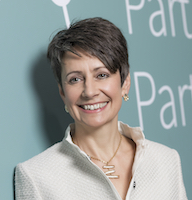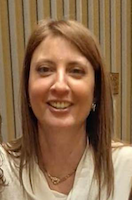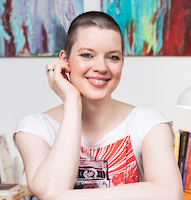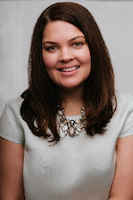 Sabine Herlitschka is Chief Executive Officer and Chief Technology Officer of Infineon Technologies Austria AG.
Sabine Herlitschka is Chief Executive Officer and Chief Technology Officer of Infineon Technologies Austria AG.
Her professional career includes industrial biotechnology research, international cooperation and financing in technology and innovation, Internships at leading organizations in the USA, Fulbright Scholar at George Washington University and Johns Hopkins University, as well as founding Vice-Rector for Research Management and International Cooperation at the Medical University of Graz/Austria.
Before joining Infineon Technologies Austria, Herlitschka was Director of European and International Programmes in the Austrian Research Promotion Agency.
For almost 20 years she has been frequently involved in European Research as advisor, project coordinator and evaluator, as well as participant and Chairperson in strategic European & international expert groups. In Febr. 2018 she has been elected Chair of the Governing Board of the 5 bn Euro European Public Private Partnership ECSEL-Electronic Components and Systems for Electronic Leadership.
Herlitschka holds a Ph.D. in Food- and Biotechnology and a Master of Business Administration. Amongst others, she is member of the Austrian Council for Research & Technology Cooperation, member of the Senate of the German Fraunhofer Society.
Being able to self-regulate one’s own learning is critical for academic success, especially in increasingly emerged online educational settings worldwide. Self-regulated learning (SRL) is a transferable lifelong learning skill that can also guide students’ future paths to study and work. It is furthermore associated with students’ wellbeing. Still, SRL is challenging and difficult for students, because many of them are not capable of accurately calibrating their own learning processes. SRL can be taught and learned. When developing relevant technology-supported mechanisms, we should take affordances of learning analytics that refers to the measurement, collection, analysis and reporting of data about learners and their learning environment. Learning analytics for SRL can help us to understand the SRL process and based on this understanding, further develop relevant supports tools to assist students in their (self-regulated) study across learning settings. This presentation will focus on the evidence and further potential of learning analytics combined with the use of artificial intelligence and mobile technologies to measure students’ evolving SRL process, and to offer theoretically grounded personalized support for enhancing students’ self-regulation in their learning process. A special attention will be also paid to the issues regarding the protection of students’ privacy when designing adaptive learning tools and evaluating their use.
 Olga Viberg is Associate Professor in Media Technology with specialization in Technology-Enhanced Learning, Department of Media Technology and Interaction Design, KTH Royal Institute of Technology, Stockholm, Sweden. She received her PhD in Informatics from Örebro University (Sweden). Her fields of expertise include technology-enhanced learning, self-regulated learning, learning analytics, mobile learning, learning design, and design science research in higher education. Her current research includes a focus on learning analytics in higher education, the design and application of mobile technology in education, the integration of formal and informal learning environments, design for learning, and a particular focus on designing technology-enhanced support for fostering students’ self-regulated learning strategies and skills needed for their study success, especially in online learning settings. Moreover, she is interested in how current emerging technologies are used in K-12 schools; how we can enable a more responsible approach to student data that can be used to improve learning and teaching, and how we can support teachers as designers of technology-enhanced learning. Her work has been published in many high ranked referred journals and conferences.
Olga Viberg is Associate Professor in Media Technology with specialization in Technology-Enhanced Learning, Department of Media Technology and Interaction Design, KTH Royal Institute of Technology, Stockholm, Sweden. She received her PhD in Informatics from Örebro University (Sweden). Her fields of expertise include technology-enhanced learning, self-regulated learning, learning analytics, mobile learning, learning design, and design science research in higher education. Her current research includes a focus on learning analytics in higher education, the design and application of mobile technology in education, the integration of formal and informal learning environments, design for learning, and a particular focus on designing technology-enhanced support for fostering students’ self-regulated learning strategies and skills needed for their study success, especially in online learning settings. Moreover, she is interested in how current emerging technologies are used in K-12 schools; how we can enable a more responsible approach to student data that can be used to improve learning and teaching, and how we can support teachers as designers of technology-enhanced learning. Her work has been published in many high ranked referred journals and conferences.
https://www.researchgate.net/profile/Olga_Viberg
The presence of women in engineering is an issue of great importance for the expansion of this academic discipline and for the success of women’s claims. The slogan of the EDUCON 2021 Conference shows the relevance of this concern. In this sense, analyzes of different indicators have been undertaken, for example: the number of female engineers among graduates, teachers, roles in companies, in management positions, whether longitudinal or cross-sectional, at different moments and places.
This presentation examines an underexplored dimension, which is the performance of women engineers in postgraduate studies; specifically, through the completion of their dissertation, a problematic goal in various fields of knowledge and geographical areas. This review is focused in the Latin American region and is carried out from the university virtual repositories, which in addition to research feasibility assurance, it provides evidence of the visibility of these works.
 Teacher, Professor, Licentiate and Doctor in Educational Sciences graduated at National University of Rosario, Argentina – where she is currently a Full Professor – and Master from Barcelona University, Spain. She also works as a Researcher of the National Scientific and Technical Research Council of Argentina at Rosario Institute of Research in Educational Sciences, where she coordinates several research projects. She has hold several international scholarships for academis stages in Universities of Spain, Belgium, Canada and Denmark. Her areas of interest are: intercultural education, ICT & education, scientific skills development & research trainning, and academic literacy in native and foreign languages.
Teacher, Professor, Licentiate and Doctor in Educational Sciences graduated at National University of Rosario, Argentina – where she is currently a Full Professor – and Master from Barcelona University, Spain. She also works as a Researcher of the National Scientific and Technical Research Council of Argentina at Rosario Institute of Research in Educational Sciences, where she coordinates several research projects. She has hold several international scholarships for academis stages in Universities of Spain, Belgium, Canada and Denmark. Her areas of interest are: intercultural education, ICT & education, scientific skills development & research trainning, and academic literacy in native and foreign languages.
For most people, sex robotics may sound like pure science fiction. In fact, however, there are already international companies that mass-produce and distribute sex robots. TrueCompanion roboticist Douglas Hines launched the world's first sex robot, Roxxxy, in 2010. The sex robots’ interactive skills such as being able to “hear what you say, speak, feel your touch, move their bodies, are mobile and have emotions and a personality” distinguish Roxxxy as a social robot. Although Roxxxy should be able to develop her own personality (or as many different roles as desired) through interaction with her users, she can also be given one of the five pre-programmed characters of one's choice: Wild Wendy, S&M Susan, Mature Martha, Frigid Farah and Young Yoko. In addition to the above abilities, Roxxxy is also able to “listen, talk, carry on a conversation and feel your touch as well as move her private areas inside when she is being ‘utilized’”, and even “have an orgasm” (TrueCompanion 2019).
The development of sex robots such as Roxxxy and others is obviously accompanied by numer-ous ethical questions that are not limited to the feminist discourse, although it is sometimes dominated by a few prominent feminist thinkers. The robot ethicist Kathleen Richardson, for instance, launched the Campaign Against Sex Robots in 2015 and represents a radical feminist argument against sex robots in general, understanding them “as part of a larger culture of ex-ploitation and objectification that reinforces rape culture and normalizes the sex trade” (Mur-phy 2017). Richardson's position is opposed by some feminist thinkers (although they certainly agree with the discriminatory gender stereotypes mentioned above) such as Vanessa de Largie. The Australian actress and sex columnist argues in a liberal feminist way that sex robots give women new opportunities to free themselves from existing patriarchal and objectifying power structures. De Largie prefers “when a person lives out his [sic!] rape fantasy with a sex bot and not with a human” (de Largie 2017).
In this talk I would like to pursue the question whether sex robots are a feminist technology. In their anthology Feminist Technology (2010), Linda L. Layne, Sharra L. Vostral and Kate Boyer propose a “working definition of feminist technology” (2010: 3) that I will refer to. Feminist technologies are “those tools plus knowledge that enhance women’s ability to develop, expand, and express their capacities” (2010: 3). A “’radically or truly’ feminist technology adopt[s] a ho-listic approach to women’s lives and make changes that radically restructure arrangements in ways that will benefit women and substantially shift the balance of power between women and men” (2010: 14).
I will then examine sex robots from the perspective of feminist movements, such as, for in-stance, radical, liberal, difference, and deconstructivist feminism. Finally, I will argue for a criti-cal-posthumanist or inclusive ethical view on sex robots (referring to Donna Haraway and Karen Barad) that questions the essentialist feminist schools of thought in general and develops argu-ments of the constructivist feminist movements.
 Janina Loh (née Sombetzki) is university assistant (Post-Doc) in the field of philosophy of tech-nology and media at the University of Vienna.
Janina Loh (née Sombetzki) is university assistant (Post-Doc) in the field of philosophy of tech-nology and media at the University of Vienna.
They studied at the Humboldt University Berlin and wrote their dissertation (2009-2013) on the issue of responsibility – Verantwortung als Begriff, Fähigkeit, Aufgabe. Eine Drei-Ebenen-Analyse (Springer 2014) – as a fellow at the graduate school Verfassung jenseits des Staates: Von der europäischen zur Globalen Rechtsgemeinschaft?, supervised by Prof. Volker Gerhardt and Prof. Rahel Jaeggi.
After a post-doc position at the Christian-Albrechts-University Kiel (2013-2016), Janina Loh is now (since April 2016) in Vienna. They just published the first German Introduction to Trans- and Posthumanism (Junius 2018) and an Introduction to Robot Ethics in German language (Suhr-kamp 2019). They habilitate on an Inclusive Ethics of Companionship (working title).
Janina Loh's main research interests lie in the field of trans- and posthumanism (especially criti-cal posthumanism), robot ethics, feminist philosophy of technology, responsibility research, Hannah Arendt, theories of judgement, and ethics in the sciences.
Janina Loh (née. Sombetzki)
University Assistant (Post-Doc) in Philosophy of Technology and Media
University of Vienna, Faculty of Philosophy and Education
Department of Philosophy
Universitätsstraße 7 (NIG), A-1010 Vienna
T +43-1-4277-46468
Email: janina.loh@univie.ac.at
Homepages: https://univie.academia.edu/JaninaSombetzki &
http://philtech.univie.ac.at/team/janina-loh-nee-sombetzki/
This plenary will show a trip during the last thirty years around Technology Enhanced Learning (TEL) Engineering and my personal vision of their evolution on my hands and on the three close woman around my academy framework in different areas, activities, geographical areas but maintaining a new approach of gender and diversity that accompanied all my professional life devoted to engineering and education, international activities and associations. Years of evolution, changes, new personal best surfing in a hostile environment but with the help and support of a lot of colleagues around the world with a similar vision, change and go ahead.
 Manuel Castro, Electrical and Computer Engineering Professor in the Spanish University for Distance Education (UNED), is expert in Applications of Simulation and Electronics and in Technology Enhanced Learning. He co-chaired the conferences LWMOOCS 2018, REV 2016, FIE 2014. Is IEEE Fellow, IEEE HKN (Eta Kappa Nu) Professional member, President Emeritus of the IEEE Education Society and Past Director of the IEEE Division VI. He has been awarded among others with: IEEE EdSoc WilliamE. Sayle Award for Achievement in Education, TAEE Tomás Pollán to Discipline Merit, and IGIP Nicola Tesla Chain. Is Honour Ambassador of Madrid Convention Bureau and co-editor of IEEE-RITA.
Manuel Castro, Electrical and Computer Engineering Professor in the Spanish University for Distance Education (UNED), is expert in Applications of Simulation and Electronics and in Technology Enhanced Learning. He co-chaired the conferences LWMOOCS 2018, REV 2016, FIE 2014. Is IEEE Fellow, IEEE HKN (Eta Kappa Nu) Professional member, President Emeritus of the IEEE Education Society and Past Director of the IEEE Division VI. He has been awarded among others with: IEEE EdSoc WilliamE. Sayle Award for Achievement in Education, TAEE Tomás Pollán to Discipline Merit, and IGIP Nicola Tesla Chain. Is Honour Ambassador of Madrid Convention Bureau and co-editor of IEEE-RITA.
Dr. Lisa Bosman, PhD in Industrial Engineering, is an Assistant Professor in the Department of Technology Leadership and Innovation within the Purdue Polytechnic Institute at Purdue University (West Lafayette, IN, USA). Her STEM education research interests include the entrepreneurial mindset, energy education, interdisciplinary education, and faculty professional development. Dr. Bosman's desire to increase STEM (science, technology, engineering, mathematics) education accessibility and attainment have resulted in her founding of the Purdue University iAGREE Labs (www.iagree.org). Dr. Bosman has authored over 50 publications in international and national journals and conferences. In addition, she has recently authored the text, Teaching the entrepreneurial mindset to engineers (Springer-Verlag GmbH, 2018); a second text (focused on integrating the entrepreneurial mindset in disciplines across campus) is forthcoming. She has obtained over $1M USD in education research funding from agencies including the National Science Foundation (NSF), Environmental Protection Agency (EPA), and the National Aeronautics and Space Administration (NASA). She has been an invited speaker and workshop facilitator for over 20 engagements. She is actively engaged in the American Society for Engineering Education (ASEE) and currently serves as a division officer. She currently serves as an engineering councilor for the Council of Undergraduate Research (3-year commitment, 2019-2022), and as a division leader for the American Society of Engineering Education (5-year commitment, 2018-2023).
 The entrepreneurial mindset is defined as the “inclination to discover, evaluate, and exploit opportunities” (Bosman & Fernhaber, 2018). Developing the entrepreneurial mindset is not only important for those wanting to start their own business, but also for individuals wanting to creatively add value to the company they work for or enhance their personal life. Moreover, the entrepreneurial mindset is critical in solving complex social issues. Within higher education, educators across disciplines are increasingly focusing on cultivating this much-needed entrepreneurial mindset in their students. Indeed, university educators are an integral part of creating the next generation of start-up entrepreneurs, corporate innovators, and world changemakers. Unfortunately, limited teaching resources on entrepreneurship exist outside of the business school. The purpose of this talk is to (1) define, describe, and provide motivation for integrating the entrepreneurial mindset into the STEM classroom, (2) provide a framework for effectively and efficiently integrating the entrepreneurial mindset into the classroom, and (3) conclude with an overview of how to convert innovative teaching and learning interventions into education research for publication and dissemination.
The entrepreneurial mindset is defined as the “inclination to discover, evaluate, and exploit opportunities” (Bosman & Fernhaber, 2018). Developing the entrepreneurial mindset is not only important for those wanting to start their own business, but also for individuals wanting to creatively add value to the company they work for or enhance their personal life. Moreover, the entrepreneurial mindset is critical in solving complex social issues. Within higher education, educators across disciplines are increasingly focusing on cultivating this much-needed entrepreneurial mindset in their students. Indeed, university educators are an integral part of creating the next generation of start-up entrepreneurs, corporate innovators, and world changemakers. Unfortunately, limited teaching resources on entrepreneurship exist outside of the business school. The purpose of this talk is to (1) define, describe, and provide motivation for integrating the entrepreneurial mindset into the STEM classroom, (2) provide a framework for effectively and efficiently integrating the entrepreneurial mindset into the classroom, and (3) conclude with an overview of how to convert innovative teaching and learning interventions into education research for publication and dissemination.
| 15 Oct 2020 | Abstract submission, Proposals for Special Sessions, Panels and Workshops |
| 26 Oct 2020 | Invitation to submit complete papers |
| 17 Dec 2020 | EXTENDED until 17 Dec 2020 (12 p.m. CET) Complete paper upload for accepted abstracts (main conference) Submission of complete papers for Special Sessions, Work In Progress and Student Poster (no abstracts) |
| 13 Jan 2021 | Notification of Acceptance, Author Registration open |
| 28 Feb 2021 | Author/Early Bird registration, Camera-ready submission for all submission types |
| 20 Apr 2021 | Pre-conference Workshops |
| 21 Apr 2021 | Conference Opening |